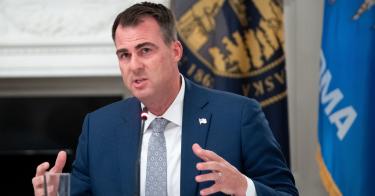Criticism continues to mount against so-called diversity, equity, and inclusion offices on college campuses. And the list of state policymakers calling for defunding the offices and eliminating their discriminatory practices is also growing—just in time for state legislators to work on the issue in the new year.
The latest lawmaker to prohibit the use of taxpayer spending on DEI programs that “grant preferential treatment” based on race, ethnicity, or national origin is Gov. Kevin Stitt (R-OK). Stitt recently issued an executive order prohibiting any executive agency, including public colleges, from requiring job applicants to complete a DEI statement or “loyalty oath” to diversity as a condition of applying. Such requirements have been found in job applications at schools around the country, including in Arizona and California.
Stitt also called for a review of DEI offices across Oklahoma’s state government to make sure the DEI practices do not violate state civil rights laws. College presidents should take note. Federal courts have specifically condemned some DEI offices’ practices, such as bias response teams. Under these bias teams, individuals on campus can make anonymous reports to campus administrators about something that they heard or saw (such as a poster), and school officials will investigate. Courts have said these teams have “vague” guidelines and “chill” speech. Both the University of Oklahoma and Oklahoma State University have bias response teams.
>>> College Presidents Expose the Moral Rot Within Their Institutions
Stitt’s executive order follows a state legislative hearing that lawmakers held in October to learn more about DEI practices. State Sen. Rob Standridge was among those voicing opposition to the discriminatory “ideology being crammed down the throats of our young kids.” Standridge has introduced proposals that would prohibit the operation of DEI offices on Oklahoma’s public college campuses.
In November, the Iowa Board of Regents, which governs the state’s public colleges, approved a policy eliminating DEI offices “that are not necessary for [colleges’] compliance or accreditation.” The board specified that all DEI services must be “broadly available to all students and/or employees.” It also called for removing DEI positions.
DEI offices routinely support programs that favor individuals based on skin color, racial preferences in college admissions being one. DEI offices at schools nationwide were part of briefs in support of racial preferences before the Supreme Court ruled against racial preferences in admissions.
It is not helping DEI’s “vague” cause that high-profile college leaders closely associated with their schools’ DEI offices badly failed to answer questions about free speech and genocide at a recent congressional hearing. Harvard President Claudine Gay is the latest Ivy League president facing accusations that she could not adequately explain her school’s position on speech and genocide at a hearing before the U.S. House of Representatives. A significant Harvard donor says Gay was hired in no small part due to support from the school’s DEI office.
>>> Charter Schools Must Avoid the DEI Blunder
The University of Pennsylvania’s president, Liz Magill, and board chairman have already resigned after Magill’s mediocre performance at the congressional hearing.
Free expression and calls for genocide and harm against students sound like topics on which DEI offices would be able to advise college presidents. Harvard’s DEI office says it “promotes an inclusive culture” and wants to establish “a profound sense of belonging for each member of our community.” But given college administrators’ failure to protect free expression on campuses nationwide over the last 15 years (or more), including those at Harvard, it is not clear what DEI offices support. In fact, the Iowa regents’ report says DEI does not have a “standardized definition” and notes the “broad” terminology DEI offices use, reinforcing what federal courts have said about DEI.
Policymakers in Oklahoma and Iowa have now joined lawmakers in Florida and Texas in pointing out DEI’s discriminatory activities and calling for an end to the offices’ racism. State legislators across the country should seek to protect civil rights and shut down DEI offices when many return to session in January. Oklahoma’s executive order expands the list of states where lawmakers have done so already to four. More should be on the way.
This piece originally appeared in the Washington Examiner




